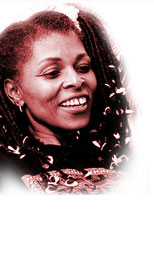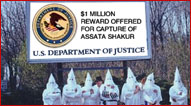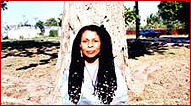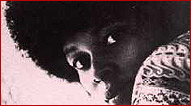


Search Site |
|

|
From exile with love: Former Black Panther Assata Shakur speaks to America from Cuba [Editor’s note: Final Call Staff Writer Nisa Islam Muhammad traveled to Cuba with a group of 15 journalists under the guidance of DeWayne Wickham and the Institute for Advanced Journalism Studies. They are documenting the African influence in the Americas. While there, she was granted an exclusive interview with exiled former Black Panther Assata Shakur.] HAVANA, Cuba (FinalCall.com)—Assata Shakur is a Black American folk hero. She is a freedom fighter that escaped the chains of oppression. She made it to the other side. She is a sister that defied the definitions of expected behavior by a Black woman. Her life is the subject of books, movies and poetry. In her own words, she speaks on Cuba and terrorism, differences between Blacks in Cuba and the U.S., living in exile and her hopes for a new world: "When I was in the Black Panther Party, they (United States) called us terrorists. How dare they call us terrorists when we were being terrorized? Terror was a constant part of my life. I was living under apartheid in North Carolina. We lived under police terror. "People have to see what’s really happening. Cuba has never attacked anybody. Cuba has solidarity with other countries. They send teachers and doctors to help the people of other countries. It believes in solidarity. "To see Cuba called a terrorist country is an insult to reality. If people come to Cuba, they’ll see a reality unlike what they’re told in America. This country wants to help, not hurt. The U.S. government has lied to its people. The U.S. government invents lies like Cuba is a terrorist country to give a pretext to destroy it. "Ronald Reagan convinced people that the little country Grenada was a threat to the big United States, that allowed the U.S. to go into Grenada. "The people in the U.S. have to struggle against a system of organized lies. When President Carter was here they said Cuba was involved in biotechnology to create bioterrorism, but now they back track and say it isn’t so. They lied and they continue to lie about Cuba. "Look at the struggle with Elian (Gonzales). Look at the terrorism committed by the Miami terrorists, the Miami Mafia. Those people (Cubans who fled after the revolution) are ex-plantation owners, exploiters of people. They want to make Cuba the same kind of place it was before but that’s not going to happen." Her name means "she who struggles," and that is the life she’s led. From growing up in racist Wilmington, N.C., to her activism with the Black Panthers and the Black Liberation Army (BLA), Ms. Shakur has struggled: "My life wasn’t beautiful and creative before I became politically active. My life was totally changed when I began to struggle." But that’s what it means to be Black in the Americas, a life of struggle. Blacks in Cuba and the United States share a history of slavery yet their paths separate in how they view their lives. I asked Sis. Assata what she saw as the differences between Blacks in Cuba and the United States: "We’ve (Blacks in America) forgotten where we came from. People in Cuba have not lost their memory. They don’t suffer from historical and cultural amnesia. Cuba has less material wealth than America but are able to do so much with so little because they know where they come from. "This was a maroon country. The maroons escaped from slavery and started their own community. Everyone needs to identify with their own history. If they know their history, they can construct their future. "The Cubans identify with those who fought against slavery. They don’t identify with the slave master. Those who made the revolution won’t let the people forget what happened to them. The people here seriously study history. "We have to de-Eurocentrize the history we learn. We have to give the real perspective of what happened. We have to create a world to know and remember our own. I had no idea how ignorant I was until I came to Cuba. I had no knowledge of authors, filmmakers and artists outside of America. We believe we’re free but we’re not. Our world vision is tainted. "We are oppressed people in the U.S. and don’t even know it. We have fewer opportunities to be doctors and lawyers as tuition increases. Our problem is that we want to belong to a society that wants to oppress us. We want to be the plantation owner. In Cuba, we want to change the plantation to a collective farm." The time is 1973 and an incident of what would now be called "racial profiling" takes place on the New Jersey Turnpike. Ms. Shakur, actively involved in the Black Liberation Army (BLA), is traveling with Malik Zayad Shakur (no relation) and Sundiata Acoli. State troopers stop them, reportedly because of a broken headlight. A trooper also explains they were "suspicious" because they had Vermont license plates. The three are made to exit the car with their hands up. All of a sudden, shots were fired. That much everybody seems to agree on. What happened next changed the course of history for Assata Shakur. Shots were fired and when all was said and done, state trooper Werner Foerster and Malik Shakur were killed. Ms. Shakur and Mr. Acoli were charged with the death of state trooper Foerster. The trial found them both guilty. The verdict was no surprise. But many question the racial injustice by the all-White jury and admitted perjury by the trial’s star witness: "I was shot with my arms in the air. My wounds could not have happened unless my arms were in the air. The bullet went in under my arm and traveled past my clavicle. It is medically impossible for that to happen if my arms were down. "I was sentenced to life plus 30 years by an all-White jury. What I saw in prison was wall-to-wall Black flesh in chains. Women caged in cells. But we’re the terrorists. It just doesn’t make sense." In a letter to Kofi Owusu dated August 24, 1973 from the Middlesex County Jail in New Brunswick, N.J., she describes the life behind bars: "i (sic) can’t begin to imagine how many sisters have been locked in this cell (the detention cell) and all the agony they felt and tears they shed. This is the cell where they put the sisters who are having hard times, kicking habits or who had been driven mad from too much oppression. "It’s moods like this that make me aware of how glad i am to be a revolutionary. i know who our enemy is, and i know that me and these swine cannot live peacefully on the same planet. i am a part of a family of field niggas and that is something very precious. "So many of my sisters are so completely unaware of who the real criminals and dogs are. They blame themselves for being hungry; they hate themselves for surviving the best way they know how, to see so much fear, doubt, hurt, and self hatred is the most painful part of being in this concentration camp. "Anyway, in spite of all, i feel a breeze behind my neck, turning to a hurricane and when i take a deep breath I can smell freedom." She spent six and a half years in prison, two of those in solitary confinement. During that time she gave birth to her daughter Kakuya. In 1979, she was liberated by comrades in a daring escape that continues to infuriate the New Jersey State Troopers. There was a nation-wide search for her. In 1984 she went to Cuba and was united with her daughter: "When I came to Cuba, I expected everyone to look like Fidel (Castro). But you see everything and everyone is different. I saw Black, White, Asians all living and working together. The Cuban women were so elegantly dressed and groomed. "People would just talk to me in the street. I would wonder why until I realized that people are not afraid of each other. People in America are afraid to walk the streets; it’s not like that here. "I realized that I had some healing to do. I didn’t know the extent of my wounds until I came to Cuba. I began to heal with my work, raising my daughter and being a part of a culture that appreciates you. "Living in Cuba means being appreciated by society, not depreciated by society. No matter what we do in America, no matter what we earn, we’re still not appreciated by American society." Who are the people on the tiny island nation of Cuba only 90 miles from Florida? Who are these people that dare to say "no" to America? Who are these 11 million revolutionaries that resist in the face of the most powerful country in the world: "Cubans feel like they have power. No matter who they are. They see themselves as part of a world. We just see ourselves as part of a ’hood. They identify with oppressed people all over the world. "When the Angolans were fighting against South Africa, they asked Cuba for help. Soldiers were sent. They went gladly. "Cubans have a different perspective of outrage and justice. A White Cuban soldier came back from fighting and expressed his disdain for the Whites that were supporting apartheid. "I just looked at him because in my mind he was White like they were but that’s not how he saw himself. He couldn’t understand how the South Africans could support apartheid. "Anytime you have a country that makes people feel indignant about atrocities, wherever they are, that country has a special place in my heart. Cuba is trying to end exploitation and atrocities." For nearly 20 years, she has carved out a life for herself in Cuba. She lives in exile and while many rejoice in her new life, America has not forgotten her alleged crimes. In 1997, the New Jersey State Troopers wrote to the Pope asking for the Pontiff’s help in having her extradited. Former New Jersey Governor Christine Todd-Whitman issued a $100,000 enticement for anyone to assist in the return of Assata Shakur. Congress issued H.R. 254 calling on Cuba to send her back, which was supported by most Black congresspersons. In the absence of normalized relations with Cuba, there is no binding extradition treaty between Cuba and the United States. What is it like to live in exile? What is it like to be away from family and friends: "Living in exile is hard. I miss my family and friends. I miss the culture, the music, how people talk, and their creativity. I miss the look of recognition Black women give each other, the understanding we express without saying a word. "I adjusted by learning to understand what was going on in the world. The Cubans helped me to adjust. I learned joys in life by learning other cultures. It was a privilege to come here to a rich culture. "I had a big fear that the Cubans would hate me when I arrived. They are very sophisticated. They were able to separate the people from America, like me, from the government." What message does she have for the youth of our people? What does she want people to know about her life: "I don’t see myself as that different from sisters who struggle for social justice. In the ’60s it was easier to identify racism. There were signs that told you where you belonged. We had to struggle to eliminate apartheid in the South. Now we have to know the other forms that exist today. "We had to learn that we’re beautiful. We had to relearn something forcefully taken from us. We had to learn about Black power. People have power if we unite. We learned the importance of coming together and being active. That fueled me. "We knew what a token was then. Today young people don’t see Condoleezza Rice or Colin Powell as tokens. That’s a problem. "I realized that I was connected to Africa. I wasn’t just a Colored girl. I was part of a whole world that wanted a better life. I’m part of a majority and not a minority. My life has been a life of growth. If you’re not growing, you’re not going to understand real love. If you’re not reaching out to help others then you’re shrinking. My life has been active. I’m not a spectator. "We can’t afford to be spectators while our lives deteriorate. We have to truly love our people and work to make that love stronger." Ms. Shakur is finishing another book about her life in exile and her experiences in Cuba. Final Call, Web Posted 06-11-2002
|



